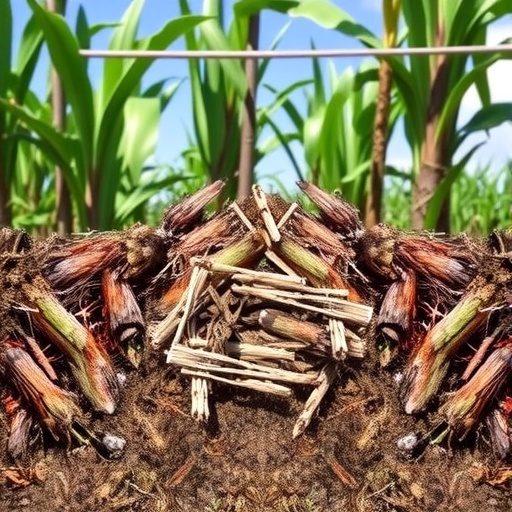In the intricate relationship between agriculture and environmental sustainability, recent research has brought to light the significant benefits of integrating sugarcane trash into the soil management practices of North Haryana. An innovative study by experts P. Ravish and S. Chaudhry has meticulously evaluated how the in situ incorporation of sugarcane waste can dramatically enhance soil health, promising profound implications for agricultural practices and sustainability efforts in the region.
This research is particularly timely given the mounting challenges of soil degradation and the urgent need for sustainable agricultural practices. North Haryana, known for its agricultural intensity, is witnessing declining soil fertility, which necessitates a reevaluation of conventional farming methods. Traditional practices often overlook the potential of agricultural residues, which, when utilized properly, can regenerate soil health and improve crop productivity.
Sugarcane trash, often considered an agricultural waste, has been historically neglected. However, the researchers found that this byproduct, when returned to the soil, contributes significantly to enhancing soil organic matter. This process not only bolsters the structure and aeration of the soil but also encourages microbial activity essential for nutrient cycling. The findings highlight a paradigm shift in how agricultural waste is perceived and utilized, emphasizing that what is often discarded could be the key to sustainable practices.
The incorporation of sugarcane trash directly into the soil results in increased moisture retention, a factor crucial for crop health, especially during dry spells. With erratic weather patterns becoming common, the ability of the soil to retain moisture is more critical than ever. Research indicates that soils enriched with organic matter from sugarcane trash retain water better, allowing crops to thrive even under challenging conditions.
Furthermore, the in situ incorporation of this agricultural byproduct exhibits remarkable potential for enhancing soil microbiome diversity. Healthy microbial communities are fundamental to soil health, influencing nutrient availability and disease resistance in plants. The study profoundly documents how sugarcane trash serves as an inoculant, fostering diverse microbial populations that contribute to a vibrant ecosystem below ground.
The researchers have also underscored the role of sugarcane trash in mitigating soil erosion, a pressing concern in many agricultural landscapes. By augmenting soil structure, the incorporation of this material can lead to a more stable soil profile, which is less susceptible to the erosive forces of wind and rain. This finding is particularly valuable in addressing the challenges associated with climate change, as soil erosion poses significant threats to agricultural productivity and food security.
Moreover, the study presents a compelling case for the economic viability of incorporating sugarcane trash into farming operations. Farmers often face a dilemma: whether to expend resources on synthetic fertilizers or to explore more sustainable, innovative practices. By leveraging sugarcane trash, farmers can reduce their dependency on chemical inputs, leading to cost savings while adhering to environmentally friendly practices.
The findings from this research are not only applicable to North Haryana but also transcend geographical boundaries. The principles of utilizing agricultural waste to restore soil health can be adapted to various regions, offering a blueprint for sustainable agriculture globally. As farmers worldwide grapple with similar challenges of soil degradation and climate variability, the integration of locally sourced organic waste presents a viable solution for enhancing resilience and productivity.
This innovative approach serves as a reminder of the importance of circular economy principles in agriculture. Rather than viewing agricultural waste as a burden, embracing it as a valuable resource can lead to healthier soils and more robust ecosystems. The study by Ravish and Chaudhry reinforces the idea that sustainable agricultural practices are pivotal in achieving long-term sustainability goals.
In conclusion, the groundbreaking research on the impacts of sugarcane trash incorporation presents a transformative opportunity for farmers and policymakers alike. The benefits of improved soil health, increased moisture retention, enhanced microbial diversity, and erosion mitigation offer a compelling case for wider adoption. As the global agricultural landscape continues to evolve, embracing such sustainable practices will be essential in addressing the complex challenges of food production in an era of climate change.
The impact of this research resonates far beyond local agricultural practices, influencing policy decisions and encouraging dialogue around sustainable practices. As highlighted by the findings, the path towards a sustainable agricultural future is paved with innovative solutions that harness the potential of nature’s resources, ultimately leading to a more resilient and productive agricultural system.
As farmers and scientists continue to collaborate, the integration of agricultural waste into sustainable practices will likely become a cornerstone of modern agriculture. The work of Ravish and Chaudhry exemplifies how research can catalyze significant shifts towards sustainable agricultural practices, ultimately benefiting farmers, consumers, and the environment at large.
Ultimately, the implications of this research extend into the realms of food security and global sustainability. By prioritizing the health of the soil through innovative practices like incorporating sugarcane trash, the agricultural sector can contribute meaningfully to overcoming the pressing challenges posed by climate change and resource depletion.
With continued exploration and endorsement of such practices, the agricultural community can look forward to a future that honors both productivity and the health of our planet, ensuring the legacy of sustainable farming for generations to come.
The significance of this research cannot be overstated, as it opens doors to new ways of thinking about waste, sustainability, and agricultural productivity, laying a foundation that other regions and sectors can adapt to build a more sustainable future.
Subject of Research: Impact of sugarcane trash incorporation on soil health.
Article Title: Evaluation of the impact of sugarcane trash in situ incorporation on soil health in North Haryana.
Article References:
Ravish, P., Chaudhry, S. Evaluation of the impact of sugarcane trash in situ incorporation on soil health in North Haryana.
Environ Monit Assess 197, 1089 (2025). https://doi.org/10.1007/s10661-025-14507-3
Image Credits: AI Generated
DOI:
Keywords: Sugarcane trash, soil health, sustainable agriculture, soil microbiome, moisture retention, soil erosion, agricultural waste management.




